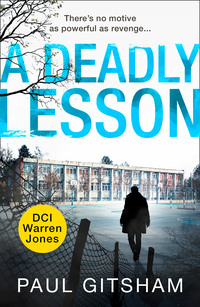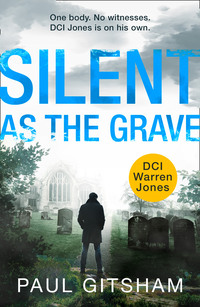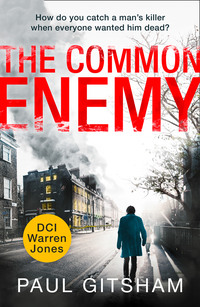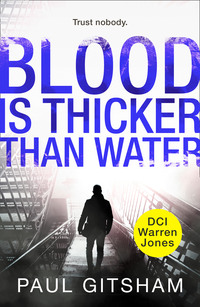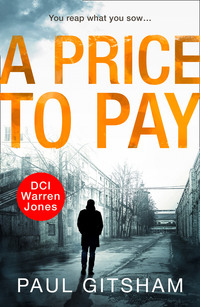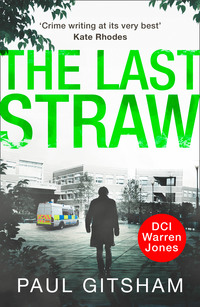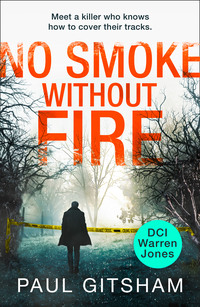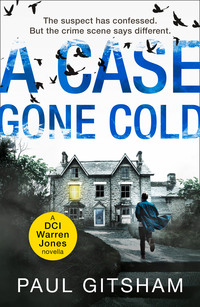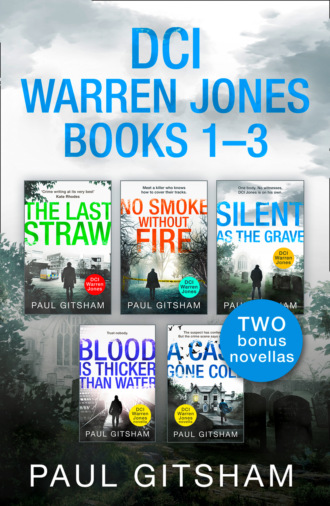
Полная версия
The DCI Warren Jones Series Books 1–3
“I’ll keep that in mind and see what the guv says — just don’t erase the footage. For the time being I just want to see what time she entered.”
“No sweat, sonny. Can you give us a clue? It’ll be quicker than just running the tape backwards ’til we find her.”
Hastings looked at Patel.
“How quick do you think she could fill a trolley like this?”
Patel pursed his lips thoughtfully, clearly caught up in the investigation despite himself.
“Realistically, I’d say a minimum of twenty minutes, plus about seven or eight minutes to put it through the till.”
Without being bidden, the security guard keyed in the command. The view shifted immediately. Running it backwards at four-times speed, it seemed to take for ever before a familiar flash of blonde hair appeared, walking into the store. At this angle, Hastings saw that the woman’s coat hid her cleavage from the cameras. Bad luck, boys, he thought to himself.
Carefully noting the time, 21:41h, and that she was alone, Hastings thanked the staff for their help. He looked at the two times in his notepad: fifty-three minutes. She certainly took her time over her shopping, he thought.
Driving back to the station, he parked the car in the garage and went looking for DCI Jones. According to the desk sergeant, Jones was unavailable. Sitting down at his workstation, Hastings wrote up a short report, noting the positive ID, the time that she entered and left the store and that she was alone. Stealing a Post-it note from his neighbour’s desk, he started to write a reminder to pick up the footage from the superstore.
Suddenly, his radio crackled into life with his call sign. Toggling it, he responded.
“Are you free, DC Hastings? Reports of a break-in at the Costcutter’s on Bailey Street. You’ve attended before.”
Hastings sighed. He certainly had attended before; three times before as a matter of fact. The small shop and off-licence was a magnet for thieves and vandals and old man Singh who owned the place practically had him on speed dial. CID were involved because they suspected that the culprits, who they had yet to positively link to the break-ins, operated on the periphery of a much bigger gang involved in large-scale thefts. The kids involved in the Costcutter break-ins were just local chancers, stealing alcohol and cigarettes to sell down the pub. The plan however was to catch them and use the threat of a conviction as leverage to get them to give information on the larger gang.
DCI Jones had asked that they lock-down any other work and make the murder of Tunbridge their priority. Hastings mulled over his options. He had done what Jones had asked him to do at Tesco and written up the report. Popping over to see Mr Singh and arranging Scenes of Crime to dust for fingerprints wouldn’t take long; then he could just add it to the file and worry about it again when the Tunbridge matter was resolved. Gary doubted that DCI Jones had meant for the lock-down to scupper ongoing investigations, and he knew that every time the kids broke in somewhere they potentially left behind the clues that might lead to their arrest.
Decision made, he trotted back down to the garage. He’d pick up the CCTV footage from Tesco later.
Chapter 12
After taking the call from Forensics, Jones and Sutton held a hurried strategy conference. Jones had already tipped off the Crown Prosecution Service’s lawyers, briefing them on the evidence that they had and their proposed interview strategy. Whilst they did so, the desk sergeant went to wake up Severino and round up his solicitor and interpreter for a client meeting. Eventually the two police officers entered the interview suite.
Severino didn’t look like a murderer — but then they rarely did. A twenty-eight-year-old of average height and build, with darkly Mediterranean good looks, he resembled a frightened child as he sat perched on the edge of his chair in the small interview room. His eyes were ringed with dark shadows and his waxy, pale complexion contrasted strongly with several days’ worth of stubble. His hair was slightly too long and it was obviously a couple of days since its last wash. His breath smelt sour, a mixture of whiskey and stale vomit. Sutton set up the recording, whilst Jones eyed their suspect.
“Why am I here? My lawyer says I have been arrested for murder. How can this be?” Severino’s English, although accented, was precise. Nevertheless, Jones decided against dismissing the translator just yet. The last thing he wanted was Severino’s lawyer to claim his testimony was inadmissible because he didn’t fully understand a question or he misspoke and inadvertently claimed to be ‘guilty’.
Severino’s lawyer, a young, earnest man who looked to be in his twenties, by the name of Daniel Stock, leant forward. “For the record, my client is unwell and was not in the clearest frame of mind when he was arrested. It is my belief that he was unable to understand his rights when read them at the time of his arrest. Anything he has said is therefore inadmissible.”
It was true that Severino had been drunk and incapable at the time of his arrest, but the desk sergeant had read him his rights a couple of hours ago and the prisoner had been sober enough to request that the police arrange a solicitor for him. Nevertheless, since he had done nothing more incriminating than burp, puke and fart since his arrest that morning, Jones decided there was nothing to be gained by arguing the point.
“Firstly, the police surgeon has proclaimed Dr Severino fit enough to be questioned. Do you feel well enough to be interviewed?”
Although the young man was clearly fighting a brutal hangover, his desire to end the ordeal and get home was greater and he nodded his assent. Good, thought Warren, pleased that they wouldn’t lose any advantage that Severino’s illness might give them.
“Of course, I am happy to read Dr Severino his rights again.” Jones recited the lines slowly and precisely, so that there could be no confusion, then reiterated what Severino was being accused of.
With the formalities over, it was time to get on with the questioning.
“What were you doing last night, Dr Severino, between about nine p.m. and ten-thirty p.m.?”
The young Italian licked his lips nervously, stealing a glance at his lawyer.
“Um, no comment,” he said uncomfortably.
So that’s the way it is going to be, thought Warren wearily. Severino’s lawyer had clearly decided that with no evidence yet disclosed, his best advice was for the accused to keep quiet, avoiding the risk of incriminating himself.
“OK. Perhaps then you could tell us what your relationship is with Professor Alan Tunbridge?”
Again the young man looked at his lawyer, before repeating his previous response, “No comment.” This time he seemed even less sure of himself and Warren felt a flicker of satisfaction. Despite his lawyer’s recommendations, Severino’s instincts were clearly telling him to speak up and end the interview sooner. Good, they could work on that inner conflict.
Warren leaned forward, feigning exasperation. “Oh, for goodness’ sake. We know that you worked for Professor Tunbridge as one of his postdoctoral research assistants. If you can’t even acknowledge something as easy for us to verify as that, we’re in for a very long, very uncomfortable few days. So please, stop being silly and answer the questions, so we can all go home.”
The doubt in Severino’s eyes grew stronger, and he looked at his lawyer again, his eyes imploring. The young solicitor studiously avoided his gaze for fear of being accused of leading his client.
Sutton leant forward. “Look, son, we know all about Tunbridge. He shafted you over your job and then wouldn’t let you write up any of your own research. Guy’s a serious bully from what we’ve heard. We know all about you vandalising his car, but that isn’t our concern. Call it karma; what goes around comes around, I say, but we need to know what happened last night. Tell us what you were doing between nine-thirty and ten-thirty p.m and we can all go home.”
Severino shook his head again; this time his “No comment” was almost inaudible.
Warren took over again. “Answering our questions at this stage can only help you, Antonio. If you can tell us where you were we can end all of this right now.”
It was too much for Severino; his already pasty face turned bone-white and he clutched his stomach. Jones and Sutton pushed their chairs back quickly. Severino’s lawyer wasn’t quite as fast. With a loud groan, Severino vomited across the metal table, before turning to his lawyer to apologise, and doing the same thing again, all over the man’s lap.
That pretty much concluded the interview, decided Jones as he called for a cleaner and offered a tissue to the hapless solicitor. They had until the following morning to charge Severino or apply for an extension. The young man was clearly conflicted. Perhaps a night of lonely contemplation would loosen his tongue. Who knew, they might even get a confession in time for the superintendent’s press conference.
As they left the interview room they met DS Kent coming the other way. “How did it go?”
“Spilled his guts,” deadpanned Sutton.
Chapter 13
Warren sat back in his leather chair. A tide of exhaustion swept over him now that the adrenaline of the day’s events had finally subsided. He’d filled in the essential paperwork in record time and the rest of the bureaucratic make-work could safely be left another twenty-four hours, he judged. Glancing at his watch, he saw that it was now past six o’clock. With a sinking feeling, Warren knew that there was no way he could get to Cambridge for six-thirty for the start of the meal. Resigned to his fate, he called Susan’s mobile.
“Oh, it’s you. Susan’s driving.”
Warren closed his eyes briefly in pain. Bernice again.
“Hello, Bernice, I’m probably going to be late for the meal. Go ahead and order without me. I’m really sorry, but I’ll be there as soon as I can.”
A stony silence.
“I’ll let her know.” The line went dead.
Warren glanced at his watch, doing some quick arithmetic. If he took the A10, he would be going against the flow of the traffic. Most people would be leaving Cambridge now after a Saturday afternoon of shopping. The road was wide and long and he could probably get away with putting his foot down. Factoring in the time necessary to nip into a garage for a bunch of flowers, Warren reckoned he could probably get there in time for the main course.
Grabbing his jacket, he headed out of his small office towards the stairs.
“Ah, Warren.”
Again!
“I was just getting ready for tomorrow morning’s press conference. DS Kent tells me that Severino has confessed everything.”
Warren blinked in surprise.
“Er, no, sir. He was ‘no commenting’, right up until the end when he was violently sick over his lawyer. I decided to terminate the interview. I thought I’d have another crack tomorrow morning.”
“Then why did DS Kent say that…? Oh, I see, ‘spilled his guts’. I must say, Warren, that joking about such a thing is a little unprofessional and has led to all sorts of confusion. I’ll have to rewrite my speech now. By the sounds of things, we’re essentially going to be repeating the statement I just released to the press half an hour ago.”
Warren was too tired to correct his superior and pin the blame on Sutton for the misunderstanding. Besides which, he could hear the loud ticking of the clock in the super’s office. “Sorry, sir. Won’t happen again.”
Running down to the car park, Warren jumped into his car, praying that no one else wanted to chat with him. The car’s dashboard clock showed 18:25. As he pulled out onto the main road he flicked the radio on: Radio 4. He doubted that the superintendent’s statement would have made it onto the national news, at least not for the half-hourly bulletins. Steering with one hand, Warren clumsily played with the auto-tune, looking for a local radio station. A sudden deafening blast of Wham! made him question yet again why he had to turn the volume up to twenty to hear Radio 4 clearly, yet all the way down to ten or less to avoid rupturing his eardrums when listening to Heart.
Finally, he found the local BBC station and suffered a few moments of a dreadful cover of an Elton John classic before the news headlines. Unsurprisingly, the murder was the top story. Warren was pleased to hear that the super had resisted the urge to spice up the statement too much, simply stating the facts, expressing the force’s condolences and urging anyone with any information to come forward. The announcer then revealed that two men, believed to be former colleagues, had been assisting the police with their inquiries. This was followed by a brief statement from the university, which spoke of the shock of the loss of such a highly respected colleague and that he would be greatly missed, thus contradicting pretty much everything that Warren had been led to believe that morning.
Glancing at the clock again, Warren saw that it was still only twenty-to seven. With any luck, he should make it in time to enjoy a quick plate of something before the show started. Relaxing a little, he retuned the radio to Heart; a guilty pleasure, their playlist reminded him of happy drunken nights in the students’ union so many years before. Drumming his fingers on the steering wheel, he couldn’t help humming along to the theme music to Fame. As he did so the tension seemed to drain out of him. His stomach rumbled and he started to fantasise about what he might have to eat. The restaurant was an Italian, he recalled, so something quick like a bowl of pasta, he decided. Meatballs would certainly fill the aching void. With lots of grated Parmesan. He glanced at the speedometer: sixty-five miles per hour. A bit over the limit, but not enough to get picked up. He decided to chance his arm a bit, since the road was so quiet, and edged up to seventy.
Pretty soon, however, it was time to ease back as the road started to wind through the quaint-sounding villages of this part of south Cambridgeshire. Soon enough he entered the village of Foxton and slowed to thirty; then watched in disbelief as the warning lights of the railway crossing started their amber flashing. He was too far away. Even if he dropped the car to second gear and floored it, he would probably be caught on CCTV as he skirted under the lowering barriers. He could imagine the headlines now: ‘Police Chief Inspector Caught Dodging Trains at Level Crossing’. Christ, that was all he needed.
As he eased to a halt the barriers finally clanked into place. Now other headlines filled his mind, ‘Police Chief Inspector Found Frozen to Death by Mother-in-law’s Disapproving Stare’ being the most prominent. Warren shook his head. Mother-in-law jokes? He must be tired. Drumming his fingers impatiently on the steering wheel, Warren prayed for an express train. A minute passed.
Nothing.
With a sigh, he turned the engine off, deciding that he might as well save some fuel.
Two minutes passed. The barrier was automatic, triggered by a passing train a couple of miles up the track. Unfortunately, the barriers didn’t differentiate between a fast-moving express train and a slow-moving freight train, the latter taking much longer to pass through than the express, of course. Finally the train arrived. Two locomotives hauling trucks laden with coal. It couldn’t have been travelling at more than twenty miles per hour. No wonder, thought Warren as almost two minutes later the fortieth and final truck passed by. Warren restarted his engine.
Two minutes later he turned it off again. The alternating red lights remained stubbornly on, the barriers locked down. Finally a passenger train clanked past the barriers and into the station. Despite the train stopping past the crossing, leaving it clear, the barriers remained firmly in place. By now Warren was fantasising about ramming the barriers. In his mind’s eye he replayed scenes from 1980s’ TV shows, many of which featured reckless drivers either jumping over or smashing through level crossings without even scratching their paint.
Finally, the passenger train started off again, crawling out of the station. Warren resisted the urge to start the engine again, a brief flash of superstition suddenly convincing him that to do so would simply result in the barriers remaining down for another train. Finally, with almost no warning, the barriers started to lift. Warren restarted his engine and shot over the crossing.
He glanced at the clock. To his dismay, it was now gone seven and he had yet to buy any flowers and he still had to negotiate the Cambridge traffic. Entering the outskirts of the city, he sailed past the Trumpington Park and Ride. Even if he had the time to park up and wait for the bus, Warren had learnt the hard way that the park and ride was not designed for much more than afternoon shopping. He and Susan had decided to use it one Saturday but had then made the mistake of staying out on a whim for a quick bite to eat and an early-evening film at the leisure park. After waiting for thirty minutes in the rain opposite the sixth-form college, it soon became clear that the park and ride stopped running ridiculously early. A quick look on the internet had revealed a rather unpalatable choice between catching a regular bus to within a half mile or so of the park and ride then walking the rest of the way in the rain, or forking out fifteen quid for a cab to the car park. They chose the latter. The cab driver agreed with them that it was a farce and a disgrace, but seemed cheerful enough when they handed over their money.
Warren kept his eyes peeled, looking for a garage. Finally, he spotted one and pulled into the forecourt. A plastic bucket by the front door held a single bunch of flowers. Warren didn’t know enough about flowers to even attempt to name the species, but he did know enough to see why these were the last bunch. Oh, well, beggars couldn’t be choosers. Entering the garage to pay for the flowers, Warren finally accepted that he had missed any chance of a meal at the restaurant. The small shop had a tiny refrigerator filled with cans and bottles of drink. He selected a bottle of Diet Coke for the caffeine, although he was tempted to go the whole hog and risk palpitations from one of the so-called ‘energy drinks’. The top shelf also held a couple of sandwiches and rolls. Picking through them, he saw that the selection included everything from mixed salad to ham and tomato and even coronation chicken, but no cheese. Not even something he could pick the crap off. The shelf below had a couple of Ginsters pasties — Spicy Chicken and Peppered Steak. Not even a Cornish or a cheese and onion slice. Warren’s stomach rumbled loudly. In desperation he turned to the snacks aisle. Finally, he settled on a couple of bags of crisps and a chocolate bar. As an afterthought, he also grabbed some strong mints to hide the smell of the crisps on his breath. Susan nagged him about his diet a lot. Since he’d met her, his palate had widened considerably; however Susan would eat pretty much anything and just couldn’t understand, try as she might, Warren’s faddy tastes.
Back in the car, Warren texted Susan, telling her that he was in Cambridge and would meet her at the Corn Exchange, before setting off again. Warren disliked driving in Cambridge. The roads were narrow and the one-way system had no apparent logic. Added to that the seemingly endless roadworks and Warren could see why the park and ride, despite its limited running times, was so popular. Warren decided to follow the signs for the Grand Arcade car park, since that was the closest to the theatre. As ever, Warren kept his eyes firmly glued to the road, watching out for foreign students looking the wrong way when crossing and suicidally arrogant cyclists meandering from lane to lane without signalling.
Somehow, Warren made it into the car park without any mishaps. He was exhausted. He tried to calculate how many hours he’d spent awake out of the past forty-eight, but his brain was too tired to process the calculation. He had a few minutes to spare and so devoured the crisps and chocolate bar. Temporarily sated, his stomach stopped rumbling for what seemed like the first time in hours. Unscrewing the bottle of Diet Coke, he chugged half of it before finally grabbing the flowers, locking the car and heading for the theatre.
Warren arrived at the Corn Exchange at a quarter to eight. Pulling out his phone, he saw that he had just missed a text from Susan.
‘Inside. Your ticket’s at the box office.’
No name or kisses. Damn, Susan must be pissed off, he realised. He’d hoped to at least make his apologies outside before going into the theatre, but never mind. Queuing impatiently, he finally retrieved his ticket.
Glancing at the stub to remind himself what they were seeing, he realised that the show’s name meant nothing to him. He couldn’t tell if it was a comedy, a play or even a musical. Declining the offer of an exorbitantly priced programme from the young girl at the door to the auditorium, Warren made his way into the dimmed theatre. Whatever the play was, it was clearly popular. Almost every seat was filled. Naturally, his seat was in the middle of the row. Apologising profusely, he squeezed his way between the narrow seating, almost standing on Dennis’ foot, before finally reaching his seat. He was sandwiched between Susan and Bernice. At his arrival, he saw Susan relax. “Sorry,” he mouthed before turning to Bernice. “Happy birthday, Bernice, sorry I missed the meal.” He offered the flowers to her and pecked her proffered cheek.
His mother-in-law had decided to go with what Warren privately termed her ‘Onassis’ look. A sharply tailored suit and bouffant hairdo, which accentuated her enviable figure. In all fairness to the woman, she was still elegantly attractive and could pass for ten years younger than her actual age. If Susan maintained her looks half as well as her mother had, Warren would count himself a lucky man. A faint whiff of Chanel No 5 completed the ensemble.
The subdued lighting glinted off a pair of large earrings. With sudden inspiration, Warren decided on a gamble. “Are those new earrings, Bernice? They go well with your new haircut.”
Miracle of miracles, Bernice actually smiled. “Yes, dear, Dennis bought me them. I’m glad you could make it.”
“I’m sorry I’m so late. I’ll fill you in on everything when we get home. You’ll get to hear it before I give my press conference,” It was a shameless exaggeration, but it worked. Bernice looked impressed.
Suddenly, the lights dimmed and music erupted from the orchestra pit. Warren quickly sat down, next to Susan. She held his arm and whispered into his ear, “Smooth operator, DCI Jones.” Warren simply smiled and kissed her on the lips.
Susan frowned slightly. “Cheese and Onion or Prawn Cocktail?”

On his way out of the theatre, Warren looked frantically for somebody selling a souvenir programme. Within two minutes of the curtain going up, the day’s stresses and strains had finally beaten him and he’d fallen sound asleep. He assumed that he hadn’t snored, otherwise Susan would have woken him up. He had no idea if Bernice had noticed. Nevertheless, he was determined not to get caught out by a grilling on the content of the show when he got home.
No sellers were to be seen. Typical, he thought, they were practically forcing them on you on the way in. Warren made a mental note of the name of the play, deciding to do a quick Google search before driving home tonight. A basic familiarity with the plot and the parroting of a few reviews should let him bluff his way out of any awkwardness. Susan and Bernice were excitedly discussing what they had just seen, so, to play it safe, Warren tried to engage his father-in-law in conversation.
It was like trying to interrogate a Trappist monk, he soon decided. It was a ten-minute stroll to the car park, during which time Warren ascertained that, yes, the garden was growing well; no, the recent dry spell hadn’t done the lawn any favours but the hosepipe was compensating, and no, Dennis didn’t think the England cricket team’s recent performance was a promise of the beginning of a new golden age for the English game.


